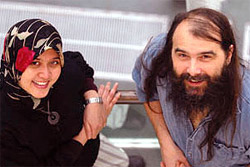Recent Stories
- Businesses urged to tap into science and technology young talent
- Digital relay baton enables remote crowd cheering of athletes
- Health Innovation Campus moves a step closer
- £7.1 million R&D boost for North West businesses
- Centre of excellence created for the next industrial revolution
- Artificial intelligence toolkit spots new child sexual abuse media online
- Strategic partnership set to help plug cyber security skills gap
- What your choice of smartphone says about you
- InfoLabTree: Discover the Story
- novi.digital Launch Event - 'An Event to Help Businesses Grow Online'
RSS Feeds
RSS feeds can deliver the latest InfoLab21 news and events direct to your browser without you having to visit the website.
In most browsers you can click on an RSS link and choose to subscribe to the feed to add it to your favourites or bookmarks.
Are You a Photologger or a Photolurker?
Story supplied by LU Press Office
 Haliyana Khalid and Professor Alan Dix
Haliyana Khalid and Professor Alan Dix
Computing Department researchers are investigating the curious world of photolurking - a growing phenomenon thrown up by the boom in online photo albums.
Photolurkers are silent, usually anonymous visitors on photologs who flick through online albums but chose not to leave any messages behind in the optional message boards.
Where once people shared photographs with family and friends, photolog websites such as Flickr have enabled people to post up their pictures in cyberspace for the world to see. Private images have become public property and it seems we are becoming a nation of avid snoopers.
Friends and family, colleagues and exes are all seen as fair game when it comes to flicking through other people's photologs. But, according to new research, photolurkers are equally interested in photographs of people they have never met.
"Not only are people interested in looking at the photographs of people they know, but also the photographs of complete strangers. Wedding photographs for example, are very popular," said Haliyana Khalid, a Phd student in Lancaster University's Computing Department.
Early research findings show that people particularly enjoy the freedom to dip in and out of other people's photographs at their leisure as a form of relaxation or entertainment. They also enjoy looking at pictures of themselves, something which they would be less likely to do in public.
Haliyana said: "People do this for emotional kicks. Curiosity, loneliness, even jealousy are just some of the reasons people look at these images. They also like to talk about them with their friends. It can become quite obsession for some people. It isn't uncommon to find people who go onto one of these sites every day."
Haliyana, who is carrying out her research along with Lancaster University's Professor Alan Dix, is currently looking at ways in which online services can be improved to make photologs more user friendly for visitors including photolurkers.
She said: "This is still relatively new technology so we are just beginning to find out how people use these sites. We have discovered what many people want is to discus these images in a more private forum - just with their own community. We are looking at ways in which photolurkers can use an intelligent web application to 'snip' images into another forum where they can discuss them with friends."
Mon 08 January 2007



